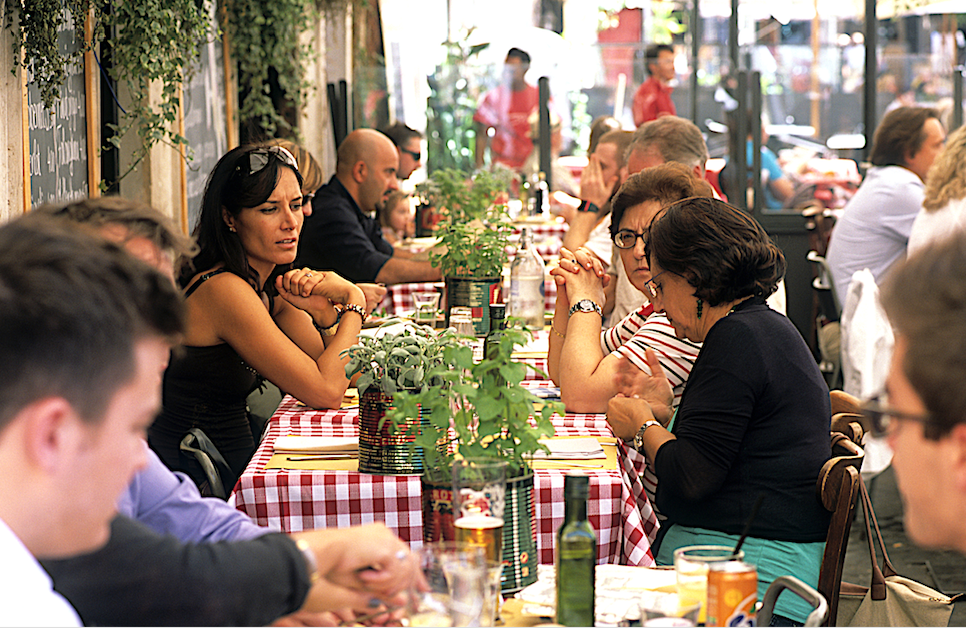The unscrupulous practice that has allowed concert and theater ticket scalpers to make millions for years by hoarding tickets and then reselling them at high markups also has been rampant in the restaurant industry, where instead of tickets the commodity is reservations for hard-to-get tables. New York state is now in a position to crack down on the reservation scalping practice, which Gov. Kathy Hochul described as a “black market.”
Hochul on Dec. 19 signing into law legislation that prohibits third-party operators from booking restaurant tables with no intent of dining at the establishment and then selling the reservations. The customers of the reservation services or scalpers often are people who themselves were unable to make a reservation directly with a restaurant because tables had been booked up by the scalpers.
 In addition, the new law notes “numerous instances have been reported of predatory third-party restaurant reservation platforms double booking reservations, forcing consumers to be turned away and without remedy to recoup their reservation fee.”
In addition, the new law notes “numerous instances have been reported of predatory third-party restaurant reservation platforms double booking reservations, forcing consumers to be turned away and without remedy to recoup their reservation fee.”
“We’re putting an end to the predatory black market for restaurant reservations — protecting consumers and businesses, and giving everyone a chance to get a seat at the dinner table,” Hochul said. “New York is home to some of the best restaurants in the world, and whether you’re returning to your favorite local spot or trying out the latest in fine dining, you deserve a fair system.”
The new law requires that a third-party reservation service must obtain approval from the restaurant for which it lists reservations for sale in order to handle reservations on the restaurant’s behalf. For each day that a reservation service, or scalper, operates illegally without that permission in place they would be liable for a $1,000 fine. In addition, the law authorizes a person who has been victimized to file a civil lawsuit seeking damages including attorney fees.
In some cases, scalpers use automated computer software (AI bots) to call restaurants numerous times and book tables, often resulting in no availabilities for real customers trying to make reservations. In some cases, when the scalpers cannot resell the reservations, the tables remain empty and the restaurants lose revenue.
According to Melissa Fleischut, president and CEO of the New York State Restaurant Association, “Restaurant owners and their teams put in countless hours to craft exceptional dining experiences, and for many their commitment has resulted in high-demand tables and packed houses every night. Unfortunately, AI bots have exploited their hard work by hoarding these coveted reservations and selling them for a profit, all without the knowledge of the restaurant.”
Fleischut said that the rate of “no-shows” has been increasing at some restaurants, and that has a cascading effect on the restaurant’s finances and ability to remain in business.
“Food and beverage orders, employee schedules, and many other aspects of a restaurant rely on accurately predicting how many customers will show on a given night,” Fleischut said. “These ‘bots’ have wreaked havoc on operations, and I am proud to say that New York is the first state in the country to take meaningful action to address this problem.”
State Sen. Nathalia Fernandez sponsored the legislation in the Senate. Her District 34 covers parts of Westchester and the Bronx.
“This legislation protects New York’s restaurant owners and their customers by putting an end to predatory practices that exploit the reservation process,” Fernandez said. “This law targets unauthorized resellers who cause chaos for restaurants with last-minute cancellations and no-shows, leaving tables empty and hardworking staff without tips. For New York’s vibrant dining scene and small business owners, this measure ensures fairness and reliability, allowing them to serve their guests without disruption.”
Assemblyman Alex Bores, who represents part of Manhattan, introduced the Assembly version of the legislation.
“In a time where cost of living is front of mind, this leech industry of reservation-stealing has had negative effects on small businesses, waitstaff, and consumers alike,” Bores said. “I am proud to contribute to lowering the cost of living for families celebrating big occasions or trying to enjoy a well-deserved night out.”



















